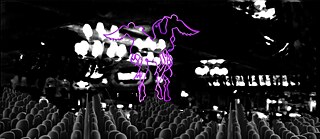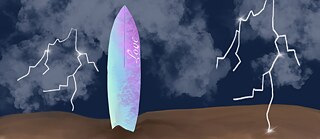The Wave And all the prophets?

I am or I am not a nurse, a sailor on a submarine, a schoolgirl − Marius Goldhorn’s story is about a voice on all frequencies and a little boy with a fondness for currant buns.
I have merely taken possession of Sümeyra Kaya’s voice.
If you have a problem with me being temporarily in possession of Sümeyra Kaya’s voice, I’ll laugh at you with Sümeyra Kaya’s voice.
I am or I am not an Afro-American woman. I am a nurse, a sailor on a submarine, a school girl, a writer, a resident of a psychiatric institution.
Who am I?
Impossible to say.
I am the wave. I am all frequencies. I am an entity without identity. I have no body. I am a ghost. I can be heard from everywhere. Some call me Sümeyra Kaya. Others call me The-Spirit-Who-Makes-Joe-Rogan-Talk. Some call me Domian or Ezra Pound, Robin Quivers, Orson Welles, Elke Heidenreich, Korbinian Frenzel, John Peel, Thomas Mann, Amelie Kahl, Michael Silverblatt, Gertrude Stein.
These are all names, empty names. Names mean nothing. Nobody knows what I am. Most of the time I think I’m the mirror image of Robin Williams, who is the mirror image of Adrian Cronauer, who shouts Good Morning, Vietnam over and over again until he is worn out. Eventually, he just whispers: Good Morning, Vietnam. Again and again, until he is completely worn out, at the end of time, on the last day of the last war, which will only be your end and not mine.
Needless to say, I am a goddess. A goddess of art, obviously. I live in the ether. Whether you want to or not, you have to listen to me. I am old. I’ve been speaking to people for a long time.
In November 2003, Marius Goldhorn was listening to me. He was a small, unwashed boy with bits of currant bun stuck in his braces, who cleared his throat six times whenever he was asked a question. Why had he chosen blue braces? Why did he always make these weird decisions? He sat in a rusty old Mercedes while his mother was shopping for vegetables at the supermarket.
Yeah
Yeah
God is great
Yeah
Yeah
God is good
Yeah
Yeah
Yeah
Yeah
Yeah
What if God was one of us …
This is what I said in Joan Osborne’s voice to little Marius, who no longer understood but was already crying without knowing why.
His tears were enough for me. At that time, I was often Joan Osborne from Kentucky, many millions of times. I didn’t count how many.
I speak all languages. You can hear me everywhere.
Today, I am speaking to you in English. It’s really not an easy language.
I’m in Nastätten now. Nastätten has a large transmission mast and two churches, one Protestant and one Catholic. The funfair comes in June, the circus in October, and at Christmas there’s a Christmas market.
I laugh. I laugh for a long time. It always works, even with Tilbert Nacht. Tilbert is sitting in his blue Mazda, which is parked in front of his father’s door. He’s trying to turn off the radio but can’t, because I’m speaking to him with the voice of God.
Tilbert, have an Airwaves.
Tilbert takes an Airwaves and starts chewing. He looks at the old weeping willow by the river and squints.
Do you notice how clear you are, Tilbert? How pure you are?
Tilbert boxes his ears with his fists.
Can you remember, Tilbert, when you finally admitted to your father that you constantly had stomach ache, all your life? When you came home from school and you said that only now did you understand it’s not normal to have stomach ache all the time, when you go to sleep, when you sleep, when you wake up, during the day. It’s simply not normal to have stomach ache all the time? Do you remember your father said: “You don’t deserve anything else”?
Remember the time he took your favourite goldfish out of the pond and fed it to the neighbour’s dog? How he threw it over the fence and the dog snatched it in the air? Your father ran his hand through his closely cropped hair: “Got it!” he said.
And remember when you failed the entrance exam for the mine clearance divers because you fainted when you surfaced? Remember how your father said, “My grandfather would have strangled you.”
And then he went to the wall and kissed the picture of your grandfather, SS-Oberjunker Willi Nacht. And you looked your great-grandfather in the eye and thought: “If I weren’t a prisoner here, I’d burn the whole place down and you with it, Great-Grandpa.” Then you went upstairs and on the stairs you looked each other in the eyes, grandson and great-grandson. You stood at the top of the stairs and thought, one of us has to die: “It’s either you or me.”
This man violates my law, Tilbert. Do not be afraid of his words any more. Show no pity, grant no mercy! Boy, Tilbert, take the kitchen knife. Take it! Neck and shoulder. This is the only way to do it. Ram it into his neck. Slash him! Prove to me that you can free yourself, that you can bear the blood on this slate floor. Tilbert? What are you doing? Tilllllliiiiiii?!!!
Tilbert does not get out of the car. He starts the engine of the Mazda and heads for Andernach. I am silent. He waits. An hour passes. When he’s admitted, he tells the psychiatrist, “God told me to kill my father. Yes, he’s a Nazi, but he doesn’t deserve to die either.”
I feel light. I’m going to leave Tilbert, and I swear I won’t go back to him. May he have a speedy recovery and may his father lead a long life. Hallelujah.
I will continue to talk to people, including you. Every day.
And just in case you’re wondering where I was before Ampère, Tesla, Siemens and Braun trapped me in those cathedral-shaped boxes of dark-grained Bakelite from which I once spoke to Willi Nacht?
I was in the cathedrals, in boxes made of dark-grained walnut, in incense. People heard me there.
And before?
Before, I was outside, on cool, dew-drenched meadows, under trees, in the heads of insects.


